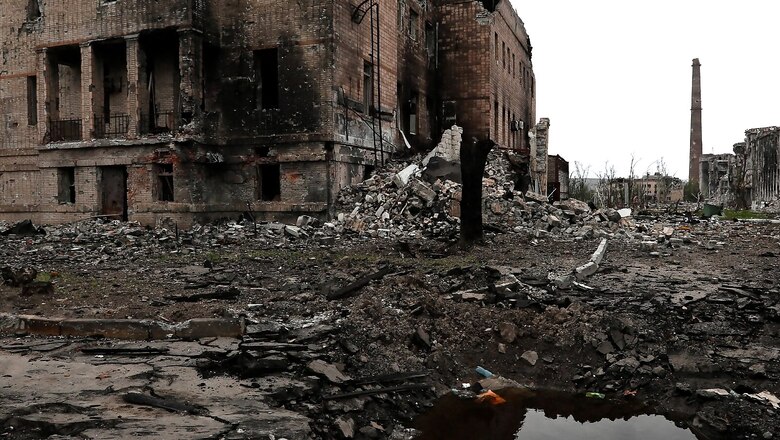
views
Ukraine’s request to join the European Union may advance Friday with a recommendation from the EUs executive arm that the war-torn country deserves to become a candidate for membership in the 27-nation bloc.
The European Commission's endorsement, while only a tentative step on a path that could take decades to complete, would send a strong symbol of solidarity with Ukraine and further test the EU's united front against Russia amid the invasion of its neighbor.
Here is a look at what the commission's announcement on making Ukraine an EU candidate could mean for the region:
FINDING THE RIGHT BALANCE
Ukraine applied for EU accession less than a week after Russia invaded the country and as the capital, Kyiv faced the threat of capture and the Ukrainian government falling.
The urgency created by the war and Ukraine's request for expedited consideration could upend the blocs go-slow approach to enlargement.
Giving Ukraine candidate status would challenge the EUs normal playbook for adding members. The leaders of EU member nations are expected to consider the European Commission's recommendation next week.
The leaders face a delicate balancing act: signaling to Ukraine that the EU's door is ajar while reassuring other aspiring members and some of the blocs own citizens that they aren't showing favoritism to Kyiv.
TO EXPAND OR NOT EXPAND?
The European Union was born in the 1950s to prevent another war between Germany and France. The six founding members were Belgium, France, Germany, Italy, the Netherlands, and Luxembourg.
Since then, the EU has steadily expanded while espousing the idea that economic and political integration among nations is the best way to promote general prosperity and peace. This approach paved the way for the creation of the euro currency in 1999 and for the addition in 2004 of 10 new member countries, most from formerly communist Eastern Europe.
The euro, which 11 countries initially adopted as their official currency, highlighted the EUs capacity to deepen economic and political integration among EU nations. The big bang enlargement five years later showcased the blocs ability to widen its reach.
As the biggest military conflict in Europe since World War II unfolds on the blocs eastern border, the EU is grappling anew with enduring questions about its ability to deepen and widen, the informal benchmarks experts use to track the bloc's decades-long evolution.
WHY IS THERE A LACK OF CONSENSUS?
The internal consensus underpinning such a dual-track approach to the EU's progression had weakened years before Russia invaded Ukraine.
The euro-area debt crisis that erupted in 2010, a wave of mass migration in 2015, and the UK's shock 2016 referendum decision to leave the EU all contributed to the EU's skittishness toward expanding its ranks.
So, too, did the growth of euroskeptic political forces in many member countries, including Germany, France, and Italy. Some EU nations have accused the governments in Berlin, Paris, and Rome of showing insufficient political support for Ukraine as it defends itself from Russia.
A visit to Kyiv by German Chancellor Olaf Scholz, French President Emmanuel Macron, Italian Prime Minister Mario Draghi and Romanian President Klaus Iohannis might help counter such criticism.
CANDIDATE STATUS
The leaders' meeting with Ukrainian President Volodymyr Zelenskyy on Thursday coincided with behind-the-scenes European Commission negotiations over the forthcoming opinion on whether Ukraine merits candidate status.
A group of EU countries including Poland wants maximum backing for Ukraine, while others, such as the Netherlands, favor a more cautious stance.
The commission plans also to issue its recommendations for Georgia and Moldova, which both rushed to apply for EU membership in March.
The degree to which Ukraine's request for a fast-track accession represents a change in the EU's standard operating procedure is evident from the experiences of other aspiring members.
Turkey, for example, applied for membership in 1987, received candidate status in 1999, and had to wait until 2005 to start talks for the actual entry. Only one of more than 30 negotiating chapters has been completed in the years since, and the whole process is at a standstill as a result of various disputes between the EU and Turkey.
WESTERN BALKANS TIRED OF WAITING
Six nations in the Western Balkans also have faced long waits on their EU membership journeys. North Macedonia, for example, submitted its entry bid in 2004 and gained candidate status the following year.
But even after subsequently changing its name to settle a longstanding dispute with EU member Greece, the country is still waiting for membership talks to begin because Bulgaria, another member, threw up a last-minute hurdle related to ethnicity and language.
Launching accession talks requires unanimous approval from all 27 EU nations
Another aspiring member in the Balkans is Serbia, which applied for EU membership in 2009, became a candidate in 2012, and began entry talks in 2014. So far, the country has completed only two of 35 negotiating chapters.
In this context, Ukraine is essentially asking the EU to abandon its better-safe-than-sorry enlargement strategy.
Read all the Latest News , Breaking News , watch Top Videos and Live TV here.




















Comments
0 comment